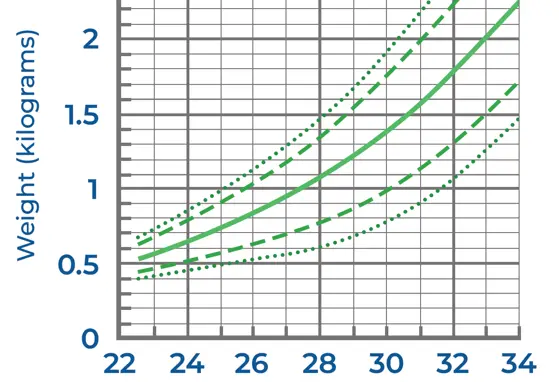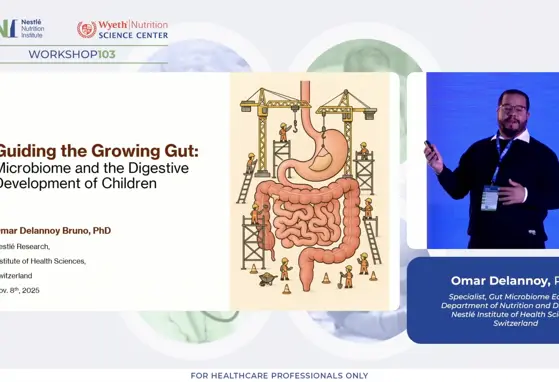Microbiota-Directed Therapy May Aid Growth in Malnourished Kids
Dietary intervention that involves the target manipulation of microbiota components may improve the growth rate in children with moderate acute malnutrition, according to new research. Moderate acute malnutrition affects more than 30 million children worldwide, according to the Food and Nutrition Bulletin. The World Health Organization defines the condition by a weight-for-height measurement that is 2 or 3 standard deviations below the international standard.
A 2014 study published in Nature has shown that malnourishment is associated with defects in children's gut microbiota, including having microbial communities that are immature and younger than those of their healthy counterparts. Microbiota immaturity also correlates with stunted growth.
The authors of new study, which was published in the New England Journal of Medicine on April 7, 2021, wrote that nutritional interventions and treatments, such as therapeutic calorie-dense foods, have limited effectiveness because they don't restore growth or fully address repairing the gut microbiome.
"This work supports the notion that healthy growth of children is linked to healthy development of their gut microbiota," study author Jeffrey Gordon, MD, director of the Edison Family Center for Genome Sciences & Systems Biology at Washington University, St. Louis, said in an interview. "This, in turn, indicates that we need to have a more encompassing view of human developmental biology — one that considers both our 'human' and 'microbial' parts."
The study establishes the impact of microbiota repair on a child's growth rate, which may have implications on policies related to complementary feeding practices, Gorden noted.
Better Outcomes Seen With Microbiota-Directed Complementary Food Prototype
For the research, 123 children with moderate acute malnutrition aged between 12 and 18 months were randomly assigned to receive a microbiota-directed complementary food prototype (MDCF-2) or ready-to-use supplementary food (RUSF). The supplementation was given to the kids twice daily for 3 months, followed by 1 month of monitoring. They looked at the weekly rate of change in the weight-for-length z score, weight-for-age z score, mid-upper-arm circumference, length-for-age z score, medical complication, gut microbiota, and blood samples in the group to determine the effectiveness of each food intervention therapy.
They found that, of the 118 children who completed the study, those in the MDCF-2 group had better outcomes than those in the RUSF group based on greater weekly growth in z scores, indicating faster growth rates. For those in the MDCF-2 group, the mean weekly change in weight-for-length z score was 0.021, compared to the RUSF group's 0.010. When it came to weight-for-age z score, the mean weekly change was 0.017 in the MDCF-2 group and 0.010 in the RUSF group. The mean weekly changes in the mid-upper-arm circumference and length-for-age z scores were similar in both groups.
When examining blood samples of the cohort, researchers noted that 714 proteins were significantly altered after 3-month MDCF-2 supplementation, compared with 82 proteins having shown significant alterations in the RUSF group.
Overall, the findings show that repairing gut microbiota was accompanied by improved weight gain and marked changes in circulating levels of protein biomarkers and mediators of numerous aspects of healthy growth.
Results Need to be Verified on a Larger Scale
Tim Joos, MD, who was not part of the study, said it is surprising that MDCF-2 was better at promoting growth than existing nutritional supplements.
"The study suggests that remedying malnutrition requires more than just ensuring adequate calorie and nutrient intake," Joos, a pediatrician at NeighborCare Health in Seattle, noted in an interview. "It is a small study and needs to be verified on a larger scale and in more diverse locations and pediatric ages (outside of the 12- to 18-month-old cohort studied)."
Wendy S. Garrett, MD, PhD, who also didn't participate in the study, wrote in an accompanying editorial that overarching questions remain concerning the long-lasting effects of the intervention on children's growth trajectory and cognitive development. She also said that the study "provides an abundance of fascinating microbiome profile data, plasma protein correlates, and metadata to sift through."
Gordon and colleagues said the findings underscore the broad effects gut microbiota has on human biology and they hope this will open the door to better definitions of wellness for infants/children.
Garrett is the Irene Heinz Given Professor of Immunology and Infectious Diseases in the departments of immunology and infectious diseases and of molecular metabolism at the Harvard School of Public Health, Boston, and she has no disclosures. Gordon is the recipient of a Thought Leader award from Agilent Technologies. Joos disclosed no relevant financial relationships.
A Microbiota-Directed Food Intervention for Undernourished ChildrenList of authors.
Jeffrey I. Gordon et al
New England Journal of Medicine 2021
If you liked this post you may also like

Post-Discharge Nutrition in Preterm Infants: Balancing Growth and Long-Term Health

Mindful Microbes: The Interplay Between Environment, Gut Microbiome, Brain, and Behavior

Exploring the Crosstalk: Nutrition, Microbiome, and Cardiometabolic Health

Guiding the Growing Gut: Microbiome and the Digestive Development of Children